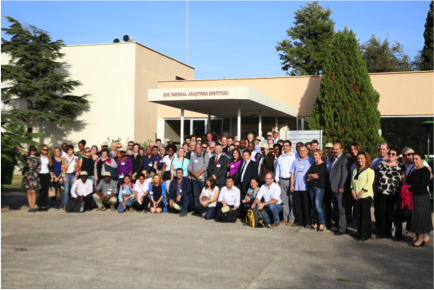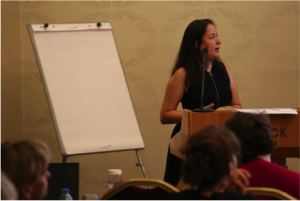Category : Feature Stories
Published : December 11, 2015 - 9:20 AM
Leading plant genetic resources scientists from around the world gathered in Izmir, Turkey from the 20-22nd October for the first-ever partner meeting on the Adapting Agriculture to Climate Change, Collecting, Protecting and Preparing Crop Wild Relatives project. This global effort jointly managed by The Global Crop Diversity Trust and The Royal Botanic Gardens, Kew, brought together 39 collecting and pre-breeding partners. The meeting allowed participants to share their knowledge, discuss lessons learned as well as challenges, and celebrate successes.
The first day was dedicated to a joint meeting with CGIAR genebank managers held at Aegan Agricultural Research Institute (AARI). Ali Osman Sari, Director of AARI alongside Marie Haga (The Crop Trust) opened the event and highlighted the global challenges facing agriculture and food security. Luigi Guarino (The Crop Trust) presented an overview of how we as an international community are doing at conserving crop diversity, whilst Susan McCouch (Cornell University) discussed what the genebank of the future will look like. The following panel discussion was lively. Among the interesting statements and questions asked included; by what method should data be integrated, how to maintain the balance and utilisation of collections and the management system of getting material.
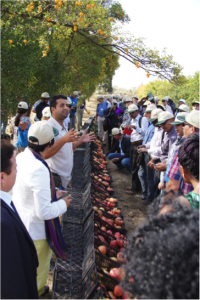
Pomegranate tasting session
In the afternoon, participants were treated to a tour of AARI’s agricultural fields and marvelled at the variety of pomegranates, quince and nuts conserved there. A delicious tasting session of the pomegranates memorably demonstrated the diversity this fruit displays, in size, shape and colour as well as taste.
The remaining days were long but fruitful and filled with sharing. Presentations and interactive sessions were given on all aspects of this visionary global, long-term project, from the initial research work, to the collecting, pre-breeding, communications and data management aspects.
In the plenary sessions, for example, Nora Castaneda-Alvarez (CIAT) explained how the gap analysis study that underpinned the priority setting was carried out, and how this effort has informed the collecting phase of the Project. Likewise, Alvaro Toledo (International Treaty on Plant Genetic Resources for Food and Agriculture) outlined the important policy issues surrounding conservation and use of crop wild relatives.
Breaking down in smaller groups, Hannes Dempewolf (The Crop Trust) facilitated the pre-breeding sessions, whilst Ruth Eastwood (Kew) led the collecting sessions.
The pre-breeding partners discussed ‘across-crop’ pre-breeding and evaluation strategies for climate change adaptation, and how the project will manage and share data. E.g. Doug Cook (UC Davis) illustrated some of the adaptations of the wild progenitors of chickpea that will be of use in climate change adaptation for the crops, such as early maturity for escaping terminal drought.
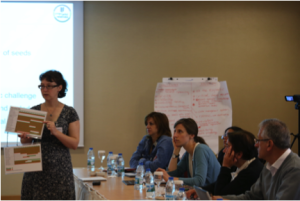
Ruth Eastwood chairs session with CWR collecting partners
The collecting partners’ session began with the participants getting to know one other through a boisterous session during which teams were asked to build a tower using just newspaper and sticky tape. The team that built the tallest structure won a prize, though the tower collapsed soon thereafter. Onto the more serious aspect, this session enabled partners to share personal experiences on identifying plants, and collecting and processing seeds. Case in point: Mohd Shukri (MARDI) gave an insightful introduction to the challenges facing banana collection in Malaysia, which even include getting to the fruit before the monkeys do!
The three-day gathering came to an end with the launch of the project’s newly enhanced website: http://www.cwrdiversty.org, and a discussion on how best to continue to engage and communicate amongst the partners and beyond: in particular to the broader plant genetic resources and breeding communities and to the media.
“It’s great to see people from so many countries come together, under one roof, to share their commitment and passion for collecting, conserving and using crop wild relatives”, says Hannes Dempewolf (The Crop Trust).
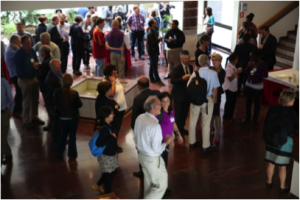
Partners interacting during coffee break
“This would not be possible if it were not for the Norwegian government and people, sole funder of this 10-year, global project. Their long-term vision allows us to work towards a common global goal: food security for today and tomorrow.”
